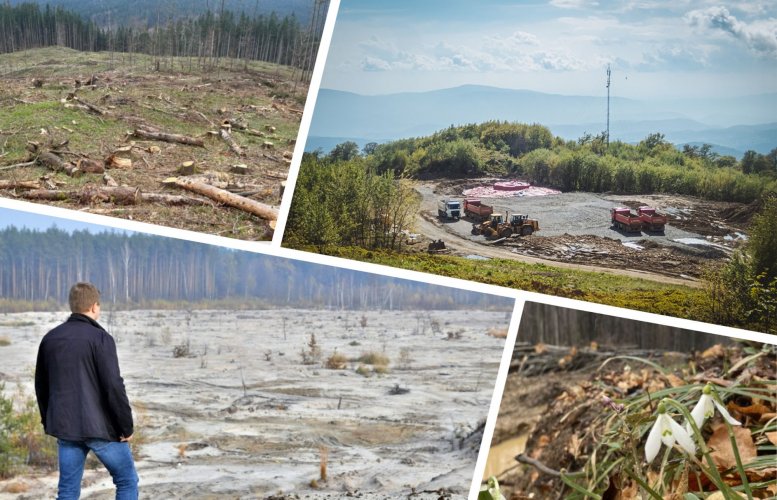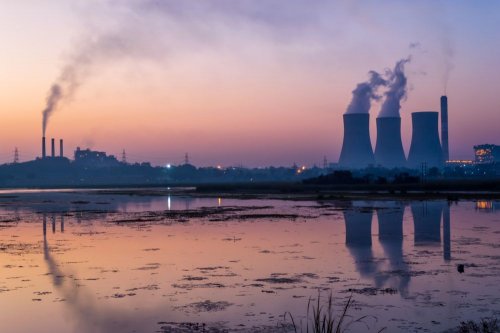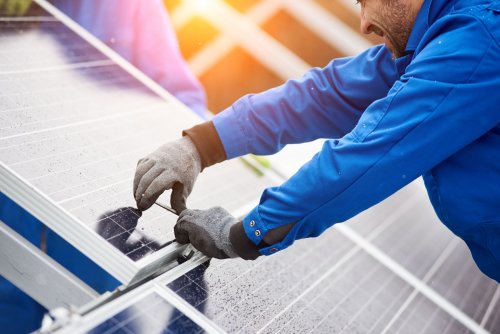At the end of October, the first 100 days had passed since the new Cabinet of Ministers of Ukraine, headed by Prime Minister Yulia Svyrydenko, decided to conduct an experiment in public administration — to unite the economy, ecology, and the agricultural sector under one roof within the Ministry of Economy, Environment, and Agriculture of Ukraine.
When rumors circulated this summer about the new government's intentions to merge the three ministries into one, environmental experts and activists almost unanimously pleaded with government officials: "Don't do it! We've been through this before." But, as practice shows, history is not a teacher in Ukrainian politics, but rather an endless series of remakes. And the decision to reorganize was made after all.
EcoPolitic decided to find out how well the ministry is dealing with issues related to environmental protection and whether its officials are able to resolve the conflict of interest that exists a priori between the three main areas of its work: the economy, ecology, and agriculture.
As the classic said: "It's already happened!"
Let us remind you that in 2019, the Ministry of Ecology and Natural Resources was already "optimized" — it was merged with the Ministry of Energy. Officials at the time also spoke of "synergy" and "simplification of procedures." A year later, this unsuccessful experiment was rolled back, but its result — lost time and lost personnel — remained.
Environmentalists and eco-activists reminded officials of this when they asked them to refrain from repeating this unsuccessful step. In their joint statement on July 15, more than 20 public organizations emphasized that the liquidation of the Ministry of Environment would be an institutional disaster for the environment, national security, and the state's strategic course toward European integration.
But despite all the reminders, the government did the same thing, only with even greater conflicts of interest between the merged departments.
The environmental community had no doubt that in the new structure, the economic bloc would "eat up" the environmental one. And it would not choke on it. Environmental issues risked disappearing from the agenda — or at least being drowned out by reports of "GDP growth" and "improvements in the investment climate."
Have these fears come true? We tried to figure it out.
How officials themselves assessed their activities in the field of environmental protection
The Ministry of Economy published materials analyzing the achievements of the new government during its first 100 days on its official website, and later its head, Minister of Economy, Environment, and Agriculture Oleksiy Sobolev, published them on his Facebook page. First of all, they boasted that "the management structure has been reorganized and the staff of the unified ministry has been optimized."
"We have optimized the staff without losing any functions. We are working with a smaller budget than the three previous departments combined, but we are launching more and faster," the minister said.
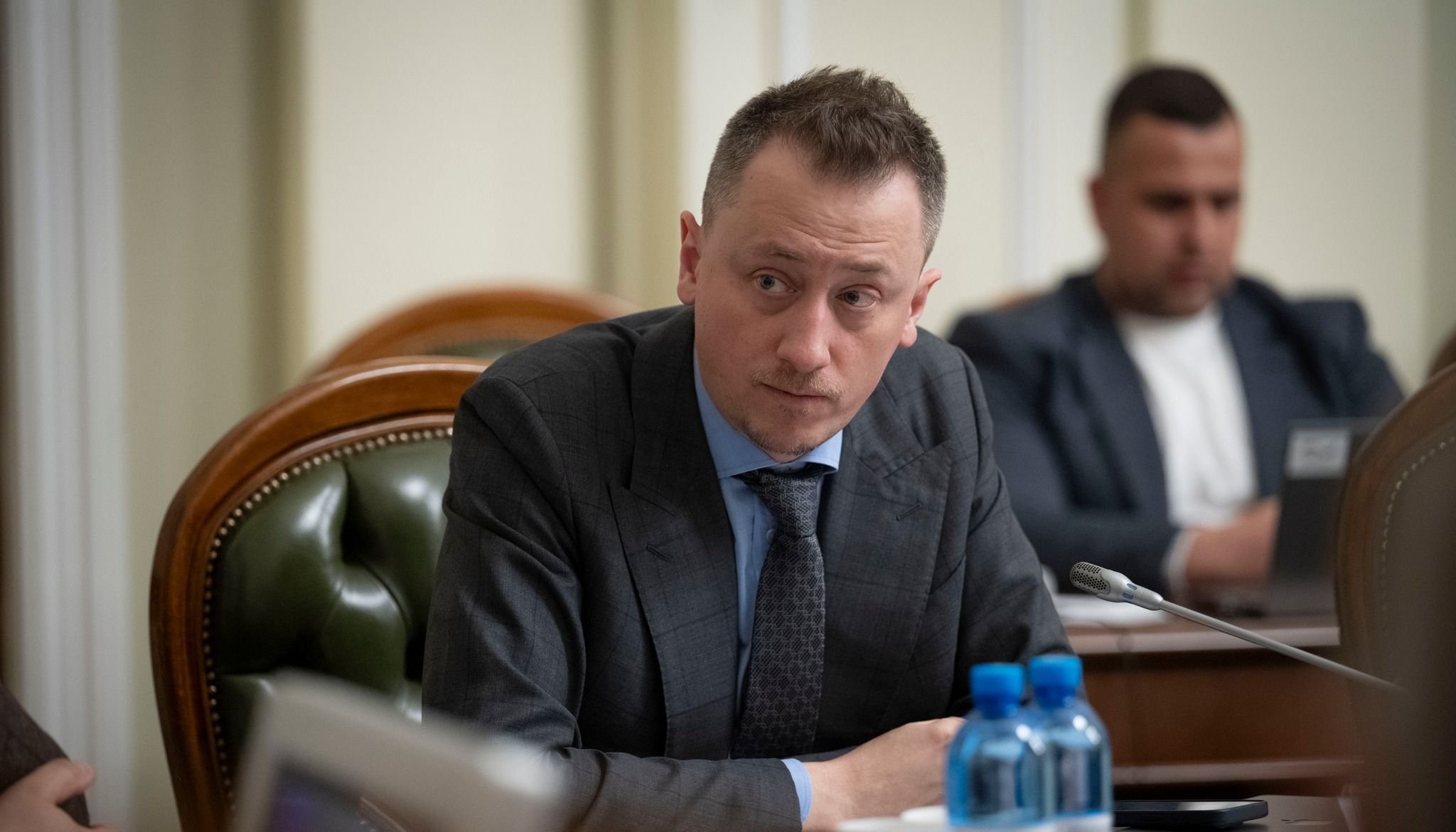
I would like to print this quote on a banner and hang it above the entrance to any Ukrainian government agency. Because "optimization" is a favorite euphemism of officials, which means "cutting people and costs."
And when officials say that "nothing has been lost," what they really mean is, "no one has noticed yet that we have lost something."
According to Oleksiy Sobolev, after the merger of ministries, "decisions are made faster, resources are used more efficiently, and the effect of reforms is felt in every sector."
We really want to believe the minister, but we have not yet seen any opinions from experts and environmental NGOs in the public sphere that would confirm this view of the top official.
On the contrary, Alexei Sobolev's post was followed by critical comments from eco-activists:
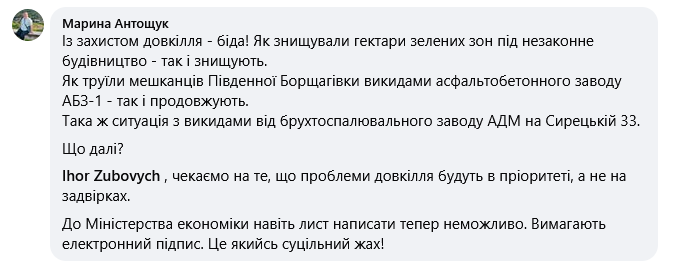


Screenshots from facebook.com
In environmental policy, the ministry has identified three points of progress:
-
the launch of environmental control posts in six regions of Ukraine;
-
the beginning of the implementation of the integrated environmental permit (IEP);
-
the start of the corporatization process of SE “Forests of Ukraine”, which is expected to enhance management transparency, improve resource efficiency, and open up opportunities for investment.
Among the nine achievements of the ministry’s first 100 days as formulated by the minister, only one was dedicated to the environment.
Now, let’s discuss in more detail the results of the “optimization” of the unified agency’s staff and try to determine whether it simply means layoffs.
Personnel minimalism
We began our analysis with personnel: we decided to look at how many top-level officials are involved in shaping and implementing environmental policy and who they are.
EcoPolitics journalists submitted a request to the Ministry of Economy and found out that 116 officials are currently dealing with environmental and natural resource issues in the ministry. For comparison and understanding of the situation: this figure is almost similar to the staff of a large supermarket such as Silpo. Whether this is enough for a country that needs to actively implement European standards in the field of environmental protection, without forgetting about its current work, is a rhetorical question. Of these 116 officials, five are deputy ministers:
-
Ihor Zubovych;
-
Pavlo Kartashov;
-
Vitaliy Kindrativ;
-
Iryna Ovcharenko;
-
Yehor Perelyhin.
Deputy Ministers
Of Soboliev’s five deputies currently working on environmental matters, only two have real and substantial experience in environmental protection. The others are “occasionally involved” or simply “from different backgrounds”:
-
Since 2018, Ihor Zubovych has worked in various positions at the State Environmental Inspectorate of Ukraine, and since December 2021, he has been the acting head of this regulatory body.
-
From December 2016 to October 2019, Iryna Ovcharenko headed the State Agency for Water Resources of Ukraine.
-
In 2010–2011, Vitalii Kindrativ was the lead specialist in the Ozone-Depleting Substances and Greenhouse Gases Monitoring Department of the State Environmental Monitoring and Atmospheric Air Division of the Ministry of Environmental Protection of Ukraine, and in 2014–2015, he served as Deputy Director of the Permitting and Licensing Activities and Regulatory Policy Department of the Environmental Safety and Waste Management Department of the Ministry of Ecology.
-
Yehor Perelyhin worked for three months as Deputy Minister for Environmental Protection and Natural Resources, without any prior experience in environmental protection. He is the only deputy from the previous Minister of Environment, Svitlana Hrynchuk, who transitioned to the merged ministry.
-
As for Pavlo Kartashov, there are mentions online stating that he “has significant diplomatic experience in international economic and environmental cooperation within the framework of the UN, OSCE, World Bank, etc.”; however, EcoPolitic has not found any detailed public information regarding this work to date. During 2018–2024, this deputy headed the Ukrainian Startup Fund.
Other officials
If we compare this with the staffing table of the former Ministry of Environmental Protection during Minister Hrynchuk's tenure, we see that there has been a reduction in both the number of deputies and lower-ranking officials. Now, instead of six deputies under the old staffing table, there are five.
The situation with other employees is even more interesting. Previously, there were 233, now there are 111. And this is despite the fact that the maximum number of employees for the updated Ministry of Economy, which was set by the Cabinet of Ministers during the merger, is 1,399 officials, which allowed the staff of both the Ministry of Agriculture and the Ministry of Environment to be retained in full.
One might assume that this more than twofold reduction in staff was due to auxiliary departments, such as the public communications department, the planning, accounting, and financial reporting department, or auxiliary sectors such as the security and mobilization sector. But no.
Here is an infographic prepared by EcoPolitics in April:
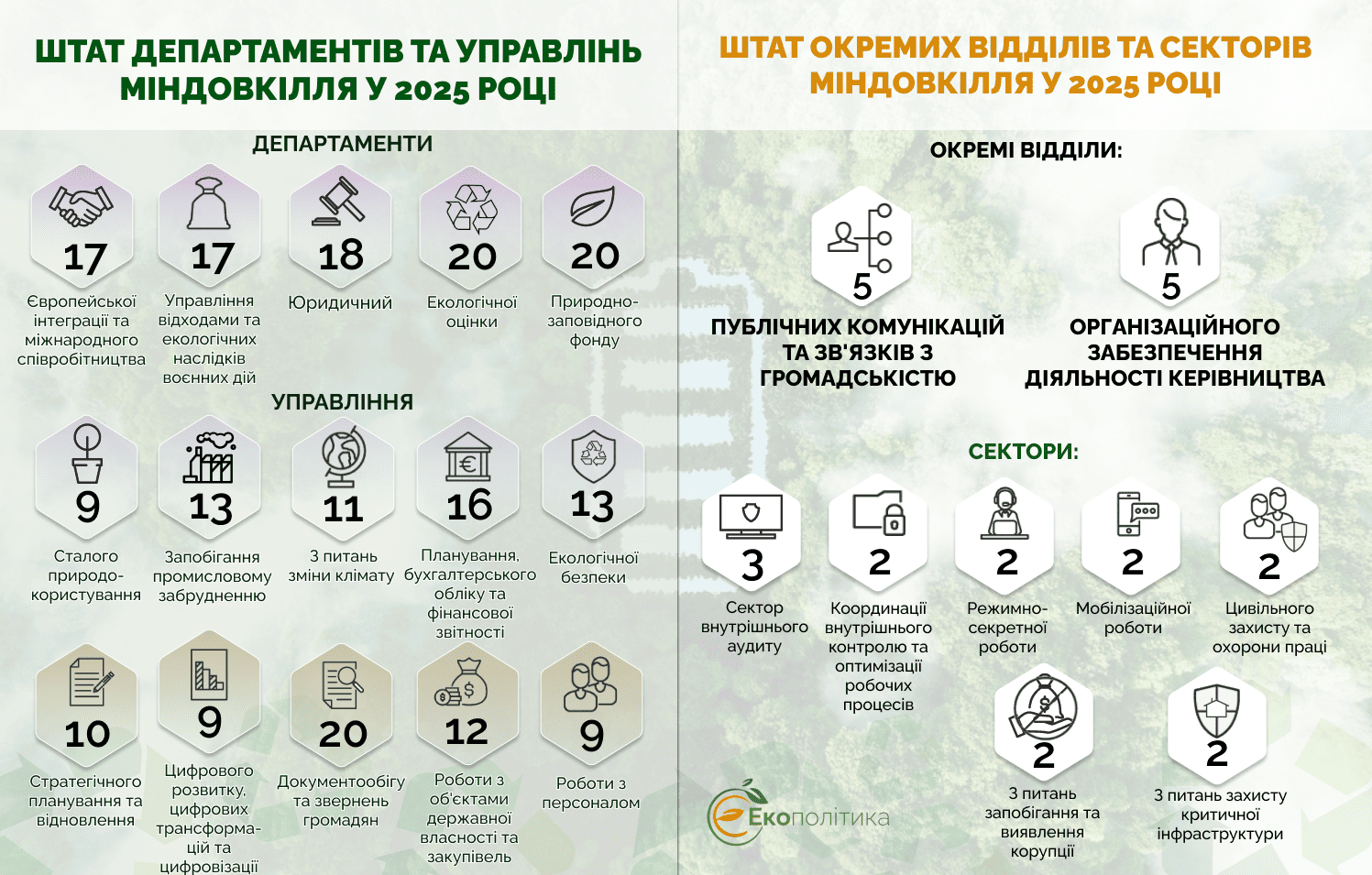
Even if we add up the number of employees in the departments and divisions that were directly involved with environmental protection, issuing permits, or digitalising the sector, we arrive at 139 full-time positions. This is 28 more positions than currently exist in the Ministry of Economy. And if we consider that former head of the Ministry of Environmental Protection and Natural Resources Svitlana Hrynchuk repeatedly emphasized at various public events the critically high workload faced by her staff, then the current situation-with further reductions in staff-appears even more dire.
The question arises: can 111 officials, in such a significantly reduced team, cope both with the ministry's current workload and effectively implement the reforms already under way-primarily the “waste” and industrial pollution reforms? There is every reason to assume that the answer is, “Definitely not.”
But who knows-perhaps Minister Soboliev possesses secret techniques for drastically boosting employees' productivity. We shall see.
According to information from the head of the Ministry of Economy, about 1,500 officials were employed in his ministry at the end of July. That is, the share of those engaged in environmental issues was approximately 8%. In our opinion, this figure is very telling. It seems that about as much space is allocated to nature in the ministry’s policy.
What about legislative developments?
In our request to the Ministry of Economy, we also asked for the updated activity plan for the ministry for 2025, reflecting its merger with two other ministries.
It turned out that as of late October, it was still awaiting approval by the minister. This means the document, which should determine priorities for the sector's work, is still somewhere between consents, revisions, and business trips.
“During the first 100 days of work of the unified Ministry, we introduced a new management logic-now each area has its own pipeline of reforms and projects,” the minister emphasized.
In other words, there is a strategy-it is just that nobody has seen it.
When "updating" is just a change of name
Since July 21, the enlarged Ministry of Economy has published drafts of 11 documents (6 resolutions, 3 orders, and 2 laws) related to environmental protection. They are available in two sections of the website: "Discussion of draft documents" and "Announcement of the publication of draft regulatory acts."
Interestingly, unlike the Ministry of Environment, the Ministry of Economy's website allows users to comment on the proposed draft document:

Screenshot from me.gov.ua.
In short, most of the draft regulatory legal acts published by the Ministry of Economy are essentially replicas of documents that the Ministry of Environmental Protection and Natural Resources had previously prepared and posted on its own website.
For example, two of the prepared resolutions introduce minor amendments to existing regulatory legal acts:
-
they continue to extend the deadlines for implementing technical regulations concerning chemical products;
-
once again, the application of the National Waste List and the Procedure for Waste Classification for Taxation Purposes is postponed for another year;
-
the name of the Ministry of Environmental Protection and Natural Resources is changed to the Ministry of Economy, Environment, and Agriculture.
The other three resolutions are new. They approve:
-
the procedure for the inventory of anthropogenic emissions, as well as the procedure for preparing and publishing the National Report on the inventory of such emissions;
-
the procedure for preparing the National Report on Progress in the Fields of Energy and Climate;
-
the procedure for implementing an experimental project on declaring fishing rights electronically.
There is also another resolution, “Certain issues regarding the identification and registration of waste for which the owner is not established,” the draft of which was published by the Ministry of Economy on October 16; it is not new. In the first half of this year, the Ministry of Environmental Protection actively worked on it.
The Ministry of Economy also decided to revise the draft Law of Ukraine “On Amendments to the Code of Ukraine on Administrative Offenses Regarding the Improvement of Liability for Offenses in the Field of Waste Management,” which the Ministry of Environmental Protection published in mid-April.
Interestingly, the current environmental officials decided not only to further increase the size of fines in the mentioned field but also to completely remove some articles, such as abolishing liability for the disposal of untreated household waste and for concealing the exceeding of established limits on the volume of waste generation and disposal.
Similarly, the Ministry of Economy has taken on the task of revising the draft law published by the Ministry of Environmental Protection in March, which strengthens criminal liability in the field of waste management. It has been revised and supplemented with new provisions. The fines for violations are again proposed to be increased several times compared to those that the previous ministry intended to introduce.
The Ministry of Economy also paid attention to the order that amends the form of the State Monitoring Program in the field of atmospheric air protection, published by the Ministry of Environmental Protection on one of its last working days – July 18. It has been partially reworked and updated: the timing, the list of pollutants have been clarified, certain parts have been removed, and details on funding and network modernization have been added.
The draft order of the Ministry of Economy "On Approval of the Fishing Regime in the Black Sea Basin in 2026" is not new at all—it is prepared every year. However, the order approving the procedure for maintaining a list of persons who grow genetically modified organisms or intend to do so is another document prepared by the Ministry of Economy "from scratch."
The unloved child of the mega-ministry
If you look at the official communication channels of the Ministry of Economy – its website, Facebook page, and Telegram channel – it immediately becomes apparent that the environment has been relegated to the role of the "unloved child" in the merged ministry. If we open its website, only four sections under the "Activities" tab are related to environmental protection:
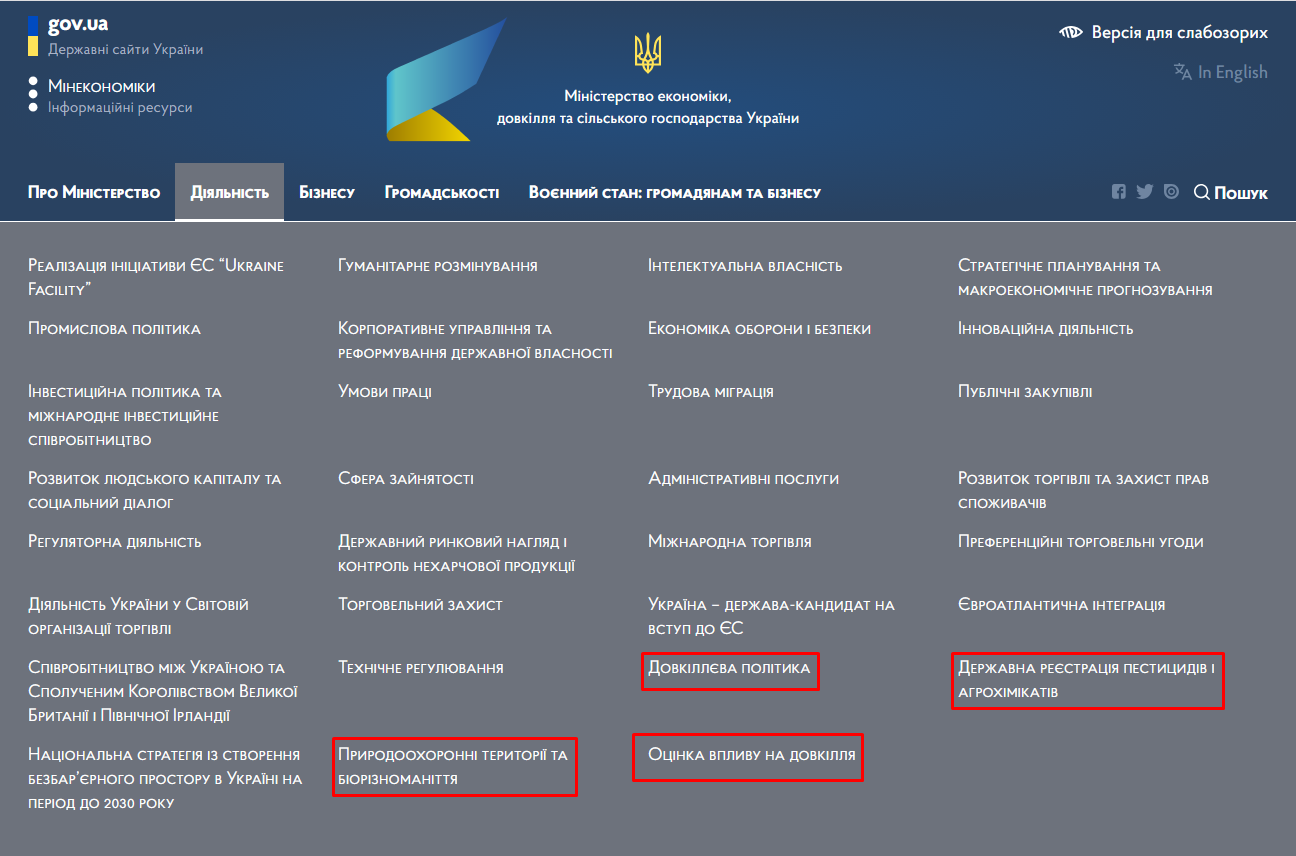
Screenshot from me.gov.ua.
Their content is very limited:
-
Limits on the use of natural resources within the territories and facilities of the national natural reserve fund.
-
Subsoil use.
-
Record of business entities that have received emission permits.
-
Orders denying the issuance of emission permits.
-
Orders denying the issuance of environmental impact assessment conclusions.
-
State register of pesticides and agrochemicals permitted for use in Ukraine.
That's all for now. It seems as if they were created not for the public, but just "for the sake of it."
Let's open the Telegram channel of the Ministry of Economy. We immediately notice that they didn't even correct the name of the ministry here — it remained the same. Although, unlike the website, it is much easier to make corrections here. Apparently, renaming the official channel in the messenger is too complicated a reform to implement in 100 days.

Screenshot from Telegram.
Now let's calculate what percentage of posts here are directly related to environmental protection issues. The total number of publications on the channel since the creation of the mega-ministry and until the beginning of November is 297, of which only 35 are related to environmental protection issues. That's only about 12%. Another telling figure.
In our opinion, the official channels of the Ministry of Economy are a reflection of its priorities. To draw an analogy, in this institutional family, the economy is the eldest child, who is bought new clothes and an iPhone, the agricultural sector is the middle child, who is bought something slightly inferior, and the environment is the youngest child, who is left at home with the cat because "we have important things to do."
Read about the criticism that the merged Ministry of Economy had to listen to from the environmental community (if it listened to it at all) and the advantages of its work noted by experts in the second part of this article, which will be published on our website soon.

